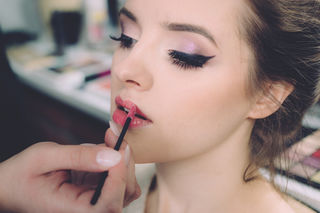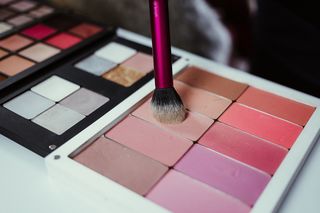Mating
Do Women Pay a Social Penalty for Wearing Makeup?
New research suggests that cosmetics can make a woman seem less trustworthy.
Posted January 23, 2019

Appearance is important. Good-looking people experience more favorable outcomes in job interviews, when being tried for a crime, when running for political office, and (of course) when seeking a romantic partner.
It should come as no surprise, then, that we are motivated to make the best of our appearance. Women, who are judged on their appearance more than men, are more likely than men to use makeup to enhance their appearance. Women also undergo over 90 percent of the 15 million cosmetic procedures performed in the U.S. every year.
Makeup and cosmetic surgery have what we might assume is the desired effect. Makeup, as traditionally applied, increases the contrast between facial skin and lips and eyes — these contrasts are naturally higher in women and in the young, so makeup results in a more feminine and youthful appearance. And research has shown that injections of Xeomin (a Botox alternative) combined with a dermal filler treatment reduce apparent age and increase perceptions of health and attractiveness.
However, enhancing one’s appearance might have other effects on how one is seen by peers. Let’s look at two new research papers that have revealed how appearance enhancement impacts upon social perceptions.
Lipstick It to Your Rivals
Humans do not live in a social vacuum: Our behaviors impact others. And when a person enhances their appearance, there are consequences not just for that person, but also for the other people in their social sphere. When we pursue a potential partner, we are competing with other people for that partner (especially if we insist on exclusive monogamy). And when we enhance our appearance, our advantage in that competition is also our rivals’ disadvantage.
Put simply, if we become relatively more attractive, our rivals become relatively less attractive.
Danielle DelPriore of the University of Utah and her colleagues at Texas Christian University — Hannah Bradshaw and Sarah Hill — wondered whether appearance enhancement might come with a social penalty. Are women who make efforts to enhance their appearance punished by their peers?
DelPriore and her team had around 120 heterosexual women read a short story about a young woman who is preparing for a job interview with a male manager. Half of the volunteers read a story in which the protagonist, Melissa, prepared for her interview by applying makeup; the other half read the same story, except this time Melissa was described as not wearing any makeup.
Those who read the “makeup” story, when compared with those who read the “no makeup” story, thought that Melissa was more deceptive, fake, manipulative, selfish, and trying to get ahead at all costs. It’s worth pointing out that the difference was not huge: Around half a point on a seven-point rating scale. Nevertheless, it does seem that women can be seen in a more negative light if they wear makeup.
Make (Up) Friends
Because reading stories isn’t quite the same as judging a real person, the researchers ran a follow-up study in which they showed a new set of volunteers photographs of women who were either wearing or not wearing makeup. This time DelPriore asked the volunteers whether they would like to affiliate with each woman: to share personal information with her, get to know her better, take her to lunch, and so forth. Female volunteers were less willing to affiliate with made-up women than with women whose faces were not made up, even though they did agree that makeup resulted in a more attractive appearance.
What could be driving these effects? Are women imposing a penalty on other women who wear makeup because those women are making an effort to enhance their appearance, or simply because those women look more attractive? DelPriore ran a third experiment to find out.

She showed a new group of straight female volunteers more photos of women wearing or not wearing cosmetics. This time the volunteers rated each woman’s attractiveness, how much effort she seemed to have made to enhance her appearance, and expressed agreement or disagreement with a series of statements about her trustworthiness — for example, “If I were to meet this woman, I would think that she is after something,” and, “If we were competing for something, I would expect her to play fair."
Analysis of the volunteers’ responses showed that women wearing makeup were seen as trying harder to enhance their appearance, and that greater efforts to enhance appearance were associated with lower ratings of trustworthiness. Importantly, this was true even when the researchers mathematically controlled for the impact of attractiveness. So, wearing makeup really does make women seem less trustworthy, at least to other straight women.
DelPriore writes in her research paper that her research has:
…important implications for relationships among female acquaintances and friends. Among adolescents, for example, it is possible that beautification efforts enacted by females may increase their likelihood of being excluded by same-sex peers or targeted by female bullies. Indeed, research suggests that as teenagers, attractive females are more likely to become the victims of indirect aggression than less attractive females.
So much for makeup. What about more extreme forms of appearance enhancement, such as cosmetic surgery?
Hannah Bradshaw and Sarah Hill, co-researchers on the DelPriore make-up study, decided to run another set of experiments. They were joined by Randi Proffitt Leyva, and Sylis Niclolas of Oakland University.
The team of psychologists noted that previous research has shown that people vary in their preferences for short-term and long-term relationships. Some are motivated to settle down with one partner, perhaps with an eye on marriage. Others are more interested in a series of short-term flings.
There is nothing right or wrong about preferring to pursue one type of relationship over another. Still, promiscuity is often viewed negatively, and this is especially true for women. Therefore, women who are perceived to be interested in short-term relationships can be treated poorly (although there is reassuring evidence that the sexual double-standard may be changing).
A Short-Term Investment?
Bradshaw and her team first confirmed in a study of 90 young women that those who put more effort into the pursuit of short-term relationships do indeed report a greater acceptance of cosmetic surgery. There was no such link between a preference for short-term relationships and acceptance of makeup: A preference for flings is only linked to an acceptance of more extreme forms of appearance enhancement.
For her second study, Bradshaw recruited 160 young men and women who had never undergone a cosmetic procedure. These men and women visited Bradshaw’s lab, ostensibly to participate in a study about perceptions of social media and online dating profiles. In reality, all the volunteers saw fake dating profiles, which included photos of the same woman. On one side of the mocked-up dating profile was a comments section, displaying messages that appeared to have been left by other users of the dating platform. Half of the volunteers saw innocuous comments, but the other half saw a comment that read:
“I’ve known her since high school, and her plastic surgeon has done more for her body than puberty ever did!”
After viewing the profiles, the volunteers answered filler questions about their own use of social media (to distract them from the main point of the study), and then rated the woman in the dating profile based on her apparent preference for short- versus long-term relationships.
The volunteers rated the woman who had reportedly undergone cosmetic surgery as more interested in short-term mating. This was true regardless of whether she was judged by a male or a female volunteer.
Future research should perhaps aim to draw links between short- versus long-term mating effort in persons who have undergone (or are about to undergo) cosmetic surgery, or to determine whether women who are perceived to be interested in brief sexual affairs as a result of undergoing cosmetic procedures are likely to suffer additional social consequences, as were the women in the DelPriore study who wore makeup.
Nevertheless, Bradshaw and her colleagues state that their:
“...results add to the growing body of literature examining the causes and consequences of female beautification tactics, and are also consistent with past literature showing a similar relationship between men’s short-term mating effort and conspicuous consumption of luxury products."
Facebook image; Syda Productions/Shutterstock
References
Bradshaw, H. K., Profitt Leyva, R., Nicolas, S. C. A., & Hill, S. E. (2019). Costly female appearance-enhancement provides cues of short-term mating effort: The case of cosmetic surgery. Personality and Individual Differences, 138, 48–55. doi:10.1016/j.paid.2018.09.019
DelPriore, D. J., Bradshaw, H. K., & Hill, S. E. (2018). Appearance enhancement produces a strategic beautification penalty among women. Evolutionary Behavioral Sciences, 12(4), 348–366. doi:10.1037/ebs0000118




